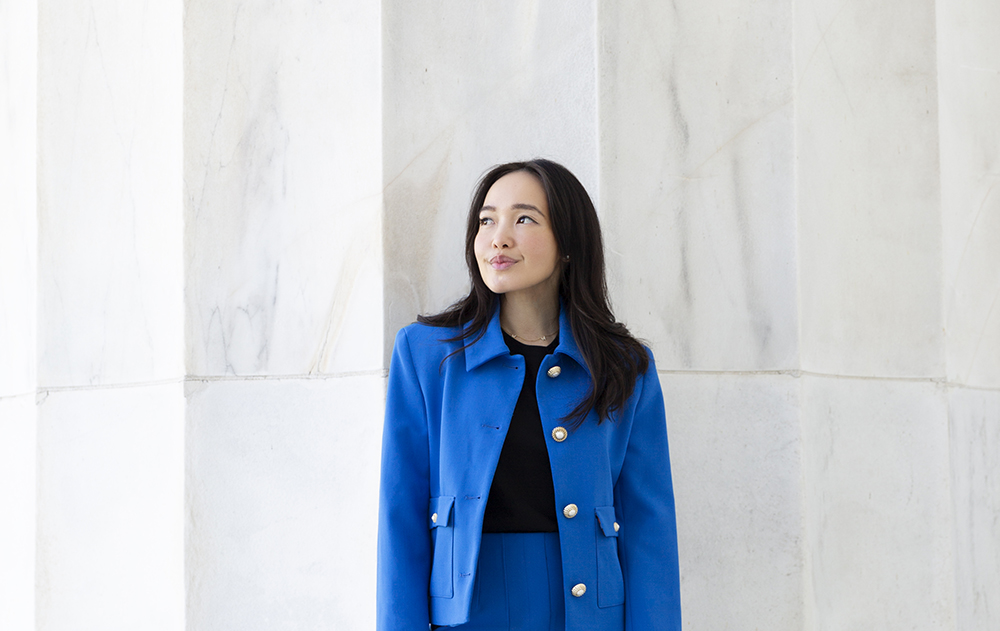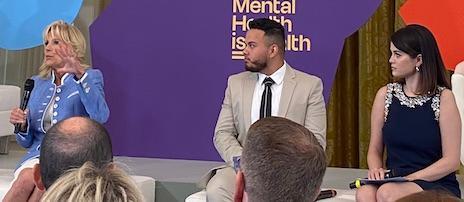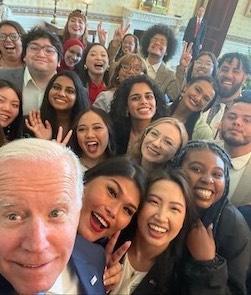
Judith Martinez ’14 Teams With Pop Star Selena Gomez to Expand Mental Health Services in Educational Settings
Santa Clara is represented in Gomez's new national mental health college ambassador program.
Last year, when Judith Martinez ’14 was asked to join Selena Gomez’s new beauty brand committed to breaking down unrealistic standards of perfection, she quickly recognized a natural intersection between Gomez’s mission at Rare Beauty, and Martinez’s own nonprofit, InHerShoes.
Founded in 2014, InHerShoes works to empower young girls and women to redefine their futures and live authentic lives through one question: “What would you do if you were 1 percent more courageous?”
But Martinez’s personal mental health awakening—and its connection to her identity and socio-cultural expectations—was another, more personal incentive for the SCU alum to sign on with the pop star, who has been upfront with fans about her depression, anxiety, and a bipolar diagnosis.
“Mental health is personal to her,” says Martinez of the global icon celebrated for her singing and acting, who is no stranger to the spotlight, or trying to live up to impossible standards. Shaping positive conversations about self-acceptance and mental health has been Selena’s way of “drawing a line in the sand,” and destigmatizing mental health, says Martinez. “Rare is more than a beauty brand. It’s about helping everyone get to a place of self-love and acceptance. It’s about owning what makes you rare.”
The cosmetics company’s mission to increase access to mental health services in educational settings happens through its non-profit arm, the Rare Impact Fund. One percent of Rare Beaty’s sales go to the Fund, which aims to raise $100 million over the next 10 years. Additional donations from philanthropic foundations, corporate partners, and individuals already has helped the Fund distribute at least $1.2 million to eight U.S. mental health organizations.
In her new role as a global Social Impact Manager, Martinez is not only working with Gomez’s Rare Beauty team, but its Mental Health Council of experts from several leading universities, organizations, and companies focused on mental health for young people. She's involved with more than a dozen Rare Impact Fund grantees across continents, spearheading educational mental health content for the brand’s 3.4 million-plus global audience, and is helping to develop and launch innovative programs such as the Rare Impact Ambassador program dedicated to youth mental health advocacy with colleges and universities.
Martinez constantly draws on her own 1 percent more courage in her work to destigmatize mental health—particularly in an industry that has historically been known to foster stigma.

First Lady Jill Biden (far left), forum participant, and Selena Gomez, at the Mental Health Youth Action Forum.
Gen Z’s mental health struggles
The Los Angeles native is acutely aware of the need to bolster mental health solutions on higher ed campuses where students are still grappling to adjust to life after the isolation of the pandemic.
“There’s something about finding safety in environments where we’re able to talk about how we’re really doing, and that it’s OK not to be OK,” says Martinez.
She knows the statistics: 46 percent of Generation Z, those ages 10 to 25, experienced increased mental health struggles during the pandemic, according to a report by the American Psychological Association. But she and others suggest that the COVID-19 period came with a silver lining.
“I think the pandemic has given people permission to talk about mental health,” she says. From her work with Rare Impact, the studies she’s read, the experts she’s talked to, and the conversations she’s had with members of Gen Z over the last year, a few themes have emerged.
“Optimism, vulnerability, and connection,” says Martinez. “People are craving vulnerability and connection, and being allowed to tell their stories is a way to de-stigmatize the subject of mental health and how we view it,” she says.
She points to a recent Generation Lab and Ogilvy report about Gen Z and mental health in the U.S. that notes 87 percent of Gen Z in the U.S. say that school and work hinders their mental health. But 80 percent also say they currently use “self-care” as a form of mental health care, including therapy and mindfulness.
“Self-care in college was never a priority for me let alone a way of life,” she says. “It was a foreign concept for me while I was in school, and I’m grateful it doesn’t have to be that way anymore.”
Happy—on the outside
Growing up in a multi-generational home in Southern California, Martinez’s concept of self-care was just learning how to cope with her immigrant family’s ups and downs. “Survival was my self-care,” she says. So she focused on becoming a perfect student, and received a scholarship to Santa Clara, a first-generation member of her Filipino-American family to attend college. At SCU, the philosophy and pre-law major continued to study hard, earned good grades, made friends, and joined clubs. By senior year, she was elected student body president.
Martinez seemed happy. And much of the time she was. But a handful of close friends witnessed a more troubling side of her life over the years, from the crying jags after a painful breakup, to sobbing grief following a dear childhood friend’s death from an overdose, to her worrisome lack of appetite and utter exhaustion.
“My roommate and a handful of floormates in Dunne Hall, they were my life rafts during my freshman year,” says Martinez. In her senior year, she says, she began to realize she was depressed. Driving much of her despair was a painful truth: after years of working towards law school and her parents’ dream for her success, Martinez knew she didn’t want to be a lawyer. Yet like many others, the idea of sharing her feelings of guilt and the emotions surrounding that decision with outsiders, “airing your dirty laundry,” as those around her called it, made her reluctant to seek professional help.
“It (depression) never even crossed my mind, I thought it was normal. I figured I was just sad,” recalls Martinez. “But the thing that was going through my mind was, ‘I should feel happy, right? Look at all these things I’m doing! I’ve checked off all the boxes! So, what’s ‘wrong’ with me?’” She didn’t know it then, but these and other experiences would lead to her life’s work today.
“Authentic and vulnerable conversations”
Her struggle to overcome the expectations of others inspired Martinez, shortly after graduation, to decline her law school acceptance and take a huge chance by starting InHerShoes in 2014. Since then, her platform that strives to build women’s courage and confidence in themselves and their futures has taken her around the country and the world, attracting partnerships with high-profile companies and celebrities advocating for women, such as Stuart Weitzman, Coach, and Kate Spade, and tennis star and entrepreneur Serena Williams.
Martinez is now doing the same on behalf of the Rare Impact Fund. The last year has been full of events, whether joining forces with MTV and the White House for the first-ever Mental Health Youth Action Forum, to Rare Beauty’s first Mental Health Virtual Event. As chair of InHerShoes, Martinez beams with pride as her staff continues the day-to-day operations, and alumni of their programming have joined their ranks.
In all of her work, Martinez says the key to de-stigmatizing mental health is to encourage people to have “authentic and vulnerable conversations” about what they’re going through.
“Part of it, too, comes from a lack of education about mental health. These complex terms are things that we might hear about, but maybe don't really know what they mean,” she explains.
“What is a bi-polar disorder? And what's the difference between anxiety and depression, and maybe you're just having a bad day? How do we talk about our emotions and can we even identify what we are feeling? Is it really sadness, or is it grief?” says Martinez. “There are nuances, and it takes courage to engage in mental health, especially our own.

President Joe Biden takes a selfie with youth participants at the Mental Health Youth Action Forum.
The ambassador program
To that end, this year she created and launched the Rare Impact Ambassador Program, which has brought together 28 college and graduate students across the U.S. to be mental health champions on their campuses.
Together with the Rare Impact team and each campus’s mental health partners, the students will focus on mental health advocacy, community building, and personal growth. As part of the program, these Ambassadors will also have the opportunity to be Youth Delegates at this year’s Youth United Nations General Assembly, contributing their voices, ideas, and solutions to some of the world’s most pressing mental health challenges for youth.
“I wanted Santa Clara to be a part of this program,” says Martinez, who reached out to some of her former mentors at SCU for their thoughts and suggestions about the idea. “I would be remiss to not go back to my roots and see how I can contribute in some way.”
Ariel Perlman ‘23, who is president of Santa Clara’s student-based Peer Health Educators Program, was a natural choice for SCU’s 2022-23 ambassador, says Martinez.
“What I would love to see Ariel and the other students do,” she says, “is be able to translate and use this experience as a blueprint for how they can make a difference through the lens of mental health, whether it’s through your campus community—or at the dinner table with loved ones.”
Judith Martinez '14 in Washington D.C. in May, where Selena Gomez, and the pop star’s Rare Impact Fund team, attended the Mental Health Youth Action Forum, hosted by First Lady Jill Biden at the White House.